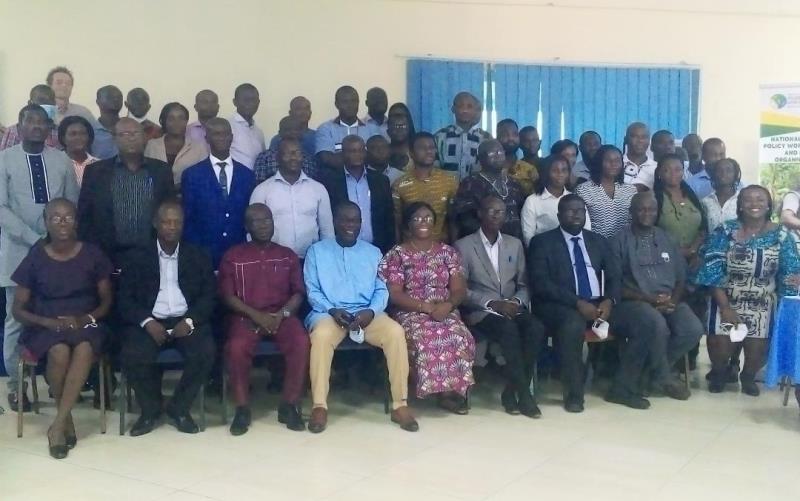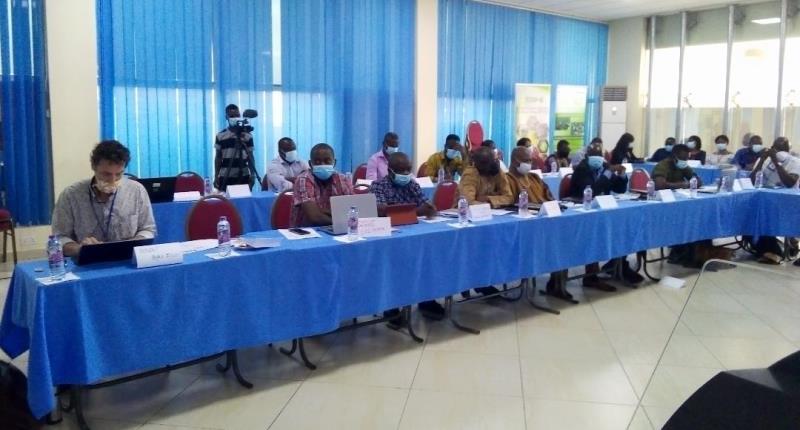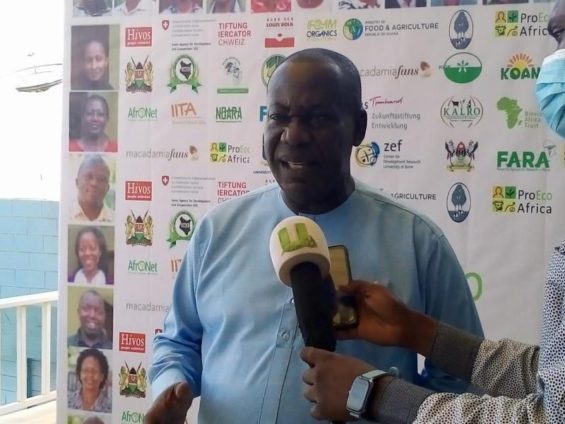Director of Crop Services Directorate at the Ministry of Food and Agriculture (MoFA), Seth Osei Akoto has urged local farmers to adopt an organic agriculture system to reduce the impact of climate change.
He said this would also enable them to increase their yield, produce healthy food crops to ensure food security and the wellbeing of consumers.
Organic farming is an agricultural system that uses fertilizers of organic origin such as compost manure, green manure, and bone meal and places emphasis on techniques such as crop rotation and companion planting.
It relies on ecological processes, biodiversity and cycles adapted to local conditions, rather than the use of inputs with adverse effects and combines traditional, innovation, and science to benefit the shared environment and promote fair relationships and good quality of life for all involved.

Mr Akoto, who was speaking at a National Dissemination and Policy Workshop of the ProEcoAfrica and Organic Food Systems Africa (OFSA) in Accra, said the negative impact of climate change remained a major challenge facing agricultural development in the sub-Saharan Africa and Ghana in particular, as it threatened food and nutrition security.
He, therefore, urged more local farmers to venture into organic farming to sustain the soil and protect the environment.
The Workshop was to present the findings of a research project conducted by ProEcoAfrica in collaboration with the University of Ghana, Agro-Eco, MoFA and the National Advisory Committee into ecological organic agriculture in the country to inform policies.
The ProEcoAfrica and OFSA Research Projects sought to generate comparative scientific evidence on the productivity, profitability and sustainability of conventional and organic production systems on small holder farms.
Started in 2013, the research was done in three countries namely Ghana, Kenya and Uganda over eight years.

Mr Akoto said the Government over the years had demonstrated commitment to the promotion of ecological organic agriculture in the country to increase productivity and protect the environment.
He explained that government's flagship agriculture programmes such as the Planting for Food and Jobs, Rearing for Food and Jobs, Planting for Export and Rural Development and Greenhouse Villages Module, among others, were all implemented with some level of ecological organic agriculture principles and practices incorporated.
This, he said, was to foster increased adoption, in line with government's regenerative agriculture drive including the promotion of different forms of organic fertilisers.
"All these demonstrates the Government's unwavering efforts in mainstreaming ecological organic agriculture into national policies and programmes as captured under Strategy 4.1.5 of Investment for Food and Jobs document which seeks to promote and expand organic farming to enable producers to access growing world demand for organic products in line with SDG Targets 2.3 and 12.2," Mr Akoto added.

Mr Gabor Figeczky, a Member of the IFOAM Organic International, who presented the findings, said organic agriculture in Ghana had the potential to be a game-changer if the main agronomic and governance challenges were addressed and smallholder farms well managed.
"We now have evidence from different real farm settings that, if implemented well, organic agriculture can considerably boost productivity and farm incomes and thus contribute substantially to Ghana's agriculture transformation agenda," he said.
He urged the government to among other things continue to promote, subsidise compost in the fertilizer subsidy scheme, strengthen and empower the organic desk at the MoFA, equip the technical capacity of extension officers to support organic producers.
Dr Oluwole Fatunbi, Lead Specialist, Inmovation Systems and Partnerships at Forum for Agricultural Research in Africa (FARA), urged producers to ensure high-quality crops to attract premium prices.
Latest Stories
-
PPA Clarification: The dark side of the World Bank’s ‘giveaways’ in Ghana by Bright Simons
49 mins -
Blinken says China helping fuel Russian threat to Ukraine
2 hours -
MHA declares May as Purple Month for Mental Health Awareness
2 hours -
WAEC arrests former headmaster over illegal students registration
2 hours -
MeToo founder Tarana Burke defiant after Harvey Weinstein ruling
2 hours -
Be alert, insist on decent messages – Dwumfour tells media
3 hours -
Father jailed 10 years for burning daughter’s genitals with hot cutlasses
3 hours -
I aim to help Ghana produce world-class athletes – Asamoah Gyan
3 hours -
Ashanti Regional Minister alleges sabotage in electricity supply
3 hours -
2024 Elections: Dampare urges Ghanaians to prioritise patriotism and display maturity
3 hours -
‘Let it rot’ campaign hits fish prices in Egypt
3 hours -
Otumfuo chalks 25 years on Golden Stool today
3 hours -
Saudi could get first Miss Universe contestant this year
3 hours -
Ghana Shippers’ Authority initiates steps to sign Service Level Agreements with stakeholders
3 hours -
Fuse ODG supports rising artiste, Fred Kobby, with funds for music video
3 hours

